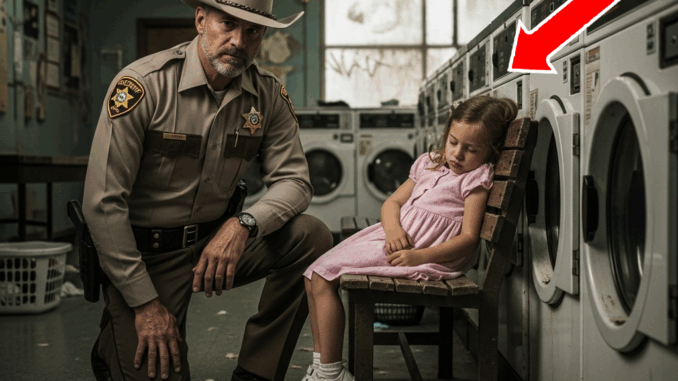

The laundromat wasn’t glamorous. Its walls smelled faintly of detergent and damp carpet, the linoleum floor bore stains older than Aaliyah herself, and the hum of old washers droned like tired engines. For most, it was just a place to finish chores.
But for thirteen-year-old Aaliyah Carter, it had become home.
It started the summer of 2007, when her mother Denise began juggling two jobs. Her father had walked out years before, and no matter how many shifts Denise picked up, bills still piled higher than paychecks. Soon, their tiny apartment grew unstable—rent overdue, lights cut, the fridge nearly empty.
Denise, proud and stubborn, hated asking for help. “It’s just temporary,” she told her daughter. But even at thirteen, Aaliyah could read the exhaustion in her eyes.
So every night, when Denise left for her overnight hospital shift, she dropped Aaliyah at the laundromat across the street. “It’s safe there. Bright lights, people coming and going. I’ll pick you up in the morning.”
At first, Aaliyah felt out of place—sitting in the corner with her backpack clutched to her chest, pretending it was just a late-night study session. She folded clothes they had washed earlier, scribbled in her notebook, sometimes dozed off to the hum of dryers. But nights turned into weeks, and soon it wasn’t strange anymore.
It was routine.
The regulars noticed. A delivery man folding uniforms. A mother juggling two kids and a mountain of laundry. College students washing sheets. Each caught glimpses of the same quiet girl with neat braids, small shoulders hunched over a notebook, waiting. Always waiting.
When asked, she’d smile politely: “Just waiting for my mom.”
But one man wasn’t satisfied with that answer.
Sheriff Tom Henderson had worn the badge in their county for over twenty years. He’d seen trouble before it started, spotted danger where others saw none. And night after night, he saw Aaliyah alone in that laundromat.
One chilly October evening, Henderson walked in. The fluorescent lights buzzed, a dryer thumped in the corner, and there she was—curled in a plastic chair, eyes heavy, pencil scratching across a worn notebook.
“Evenin’,” he said gently.
Startled, she looked up. “Hi.”
“What’s your name?”
“Aaliyah.”
“Your mom around?”
“She’s working. She’ll be here later.”
Her tone wasn’t defensive. Just practiced. Henderson nodded, bought a soda, and sat nearby. He didn’t push. But he noticed how tightly she clutched her backpack, as if it were armor.
The weeks passed, and Henderson started stopping by. Sometimes he asked about school. Sometimes about her sketches. Piece by piece, the truth unfolded: the laundromat wasn’t for laundry. It was her shelter until her mom’s shift ended.
One night, the wind howled outside, rattling the glass doors. Henderson noticed her sweater was thin, her sneakers worn through.
“You warm enough, kiddo?” he asked softly.
She nodded fast. “I’m fine.”
But her lips were trembling.
That night, Henderson stayed in his cruiser long after closing, watching as Denise arrived in faded scrubs. She looked older than her years, fatigue in every step. But the way she bent down and kissed Aaliyah’s forehead carried a love that was undeniable—and heavy with guilt.
It broke him.
The next morning, instead of filing a social services report that might have torn them apart, Henderson made calls. Quiet ones.
The church down the road covered part of Denise’s rent. The local diner sent meals twice a week. The school principal arranged tutoring. And Henderson himself? He became a fixture. Sometimes bringing snacks. Sometimes a blanket. Sometimes just sitting quietly while Aaliyah finished her homework.
It was on one of those nights, with the machines humming around them, when Aaliyah leaned sleepily against his shoulder, that Henderson’s tears finally came—silent, hidden. Because he realized he wasn’t just watching over her.
She was healing something in him too—the hollow left by his own daughter, lost in a car crash years before.
By Christmas, things had changed. Denise dropped one of her jobs. Their apartment was warm again, the fridge full. Aaliyah no longer spent nights in the laundromat.
But she never forgot it.
Years later, when Aaliyah crossed the stage at her college graduation, Sheriff Henderson sat in the crowd, tears streaming down his face. And when she gave her speech, she told the story of the laundromat—the cold nights, the hum of dryers, the sheriff who noticed her when no one else did.
“Sometimes,” she said, her voice steady, “the places that seem the coldest are where the warmest kindness lives. And sometimes, the strangers you least expect become the ones who save you.”
The crowd rose to its feet. Denise wept. Henderson wept harder.
And Aaliyah smiled, no longer the laundromat girl—because she had become something far greater.
Để lại một phản hồi